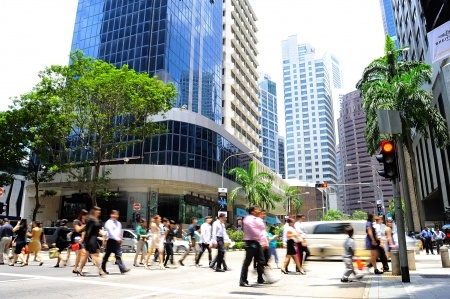20 November, 2017
The exchange of virtual currencies into national currencies or other virtual currencies is to be regulated in Singapore, the city state's central bank has said.
The Monetary Authority of Singapore (MAS) said the move will seek to "address money laundering and terrorism financing risks".
The new rules will be included with a broader set of new rules governing payment services, MAS said. New laws on payment services are set to take effect in the EU from early 2018.
Virtual currency exchanges will face a raft of new obligations under the new regime, MAS said.
"Such intermediaries will be required to put in place policies, procedures and controls to address [the money laundering and terrorism financing] risks," MAS said. "These will include requirements to conduct customer due diligence, monitor transactions, perform screening, report suspicious transactions and keep adequate records."
MAS announced its plans for tighter regulation of virtual currency exchanges in new guidance it issued on 'digital token offerings'. The guide builds on advice MAS issued to consumers in August around the potential risks of digital token and virtual currency-related investment schemes, which it issued after earlier clarifying that offering digital tokens as security during a trade in assets, or issuing them as shares, would be considered a regulated activity in Singapore, subject to some exemptions.
In its latest guide, MAS explained that some businesses that make an offer of digital tokens may be required to prepare a prospectus alongside that offer, and that others may be subject to further rules on investment restrictions and business conduct under Singapore securities laws.
MAS further clarified that intermediaries, such as platform providers and financial advisers, who facilitate offers or issues of digital tokens, may also be subject to regulation in Singapore and be obliged to hold a capital markets services licence to cover their activities.
The regulatory regime could also apply to platform providers and financial advisers based overseas, it said.
Even where the offer of digital tokens falls outside the scope of MAS' regulation, the businesses offering them "may nonetheless be subject to other legislation for combating money laundering and terrorism financing", MAS said.
Under those laws, the businesses could face obligations to report suspicious transactions to Singaporean authorities, and face additional "prohibitions from dealing with or providing financial services to designated individuals and entities", it said.
"The active regulation of this industry can help attract interest from investors with the assurance of oversight," said Bryan Tan, a technology law expert at Pinsent Masons MPillay, the Singapore joint law venture between MPillay and Pinsent Masons, the law firm behind Out-Law.com.
This article was published in Out-law here.
For further information please contact:
Bryan Tan, Partner, Pinsent Masons MPillay
bryan.tan@pinsentmasons.com

.jpg)





